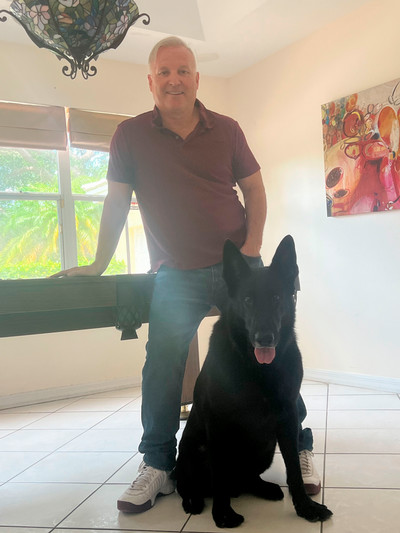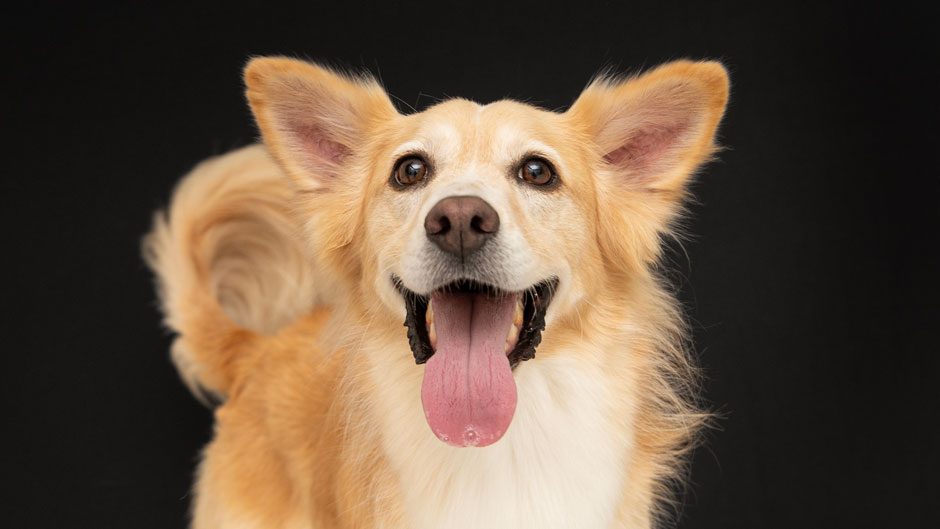Mark Rowlands, chair of the Department of Philosophy at the University of Miami College of Arts and Sciences, has spent several decades writing about animal minds. He is the author of 25 books including a bestselling memoir, “The Philosopher and the Wolf,” which chronicles the years he spent in the company of a wolf he adopted as a cub. Rowlands recently published a new book, “The Happiness of Dogs: Why the Unexamined Life Is Most Worth Living,” that explores what humans can learn from dogs about some of life’s most pressing questions. In this interview, he discusses some of the key takeaways.
1. What inspired you to write this book?

I suppose the immediate inspiration was walking my dog, Shadow. Every morning, I take him for a walk on the canal that lies behind the house. The inspiration for the book was provided by the absolute delight he takes in doing the same things every day: chasing iguanas and exiling them across the canal. The very next morning they’ll have returned, and he does the same thing over and over again, and the joy never dims.
Being a professional philosopher, I was struck by how much this is like the myth of Sisyphus. Sisyphus was a mortal who offended the gods, and they made him roll a large rock up a hill. When it gets to the top, it rolls back down, and he has to start all over again. This is usually taken as the epitome of a meaningless existence—it’s just repetitive activity aimed only at its own repetition.
It seemed to me on those walks on the canal that this was the most meaningful part of Shadow’s day. I started thinking, ‘What’s the difference between dogs and us that something that is the epitome of meaninglessness for us would be intensely meaningful for them?’ and that’s how the book started.
2. What can humans learn from dogs about the meaning of life?
The key takeaway is that meaning in life is happiness of a certain sort. It’s happiness that comes from—is an expression of—your nature, of what you really are. Shadow’s nature is a hunting and guarding dog, and that’s what he’s doing when he runs. He’s simultaneously hunting the iguanas and patrolling his territory. His happiness is an expression of this nature. That’s one theme of the book: Meaning in life is a matter of happiness that’s authentic in the sense that it comes from what you are.
3. Why is it that humans often struggle to find meaning in repetitive daily tasks while your dog, Shadow, enjoys chasing after iguanas day after day?
This is much more difficult for us because we don’t have a nature in the same way as dogs. There’s this capacity called reflection, which developed in us a long, long time ago. Reflection is the ability to think about what you’re doing, why you’re doing it, and so on. Once you have this ability, then you live two lives: There’s the life you live in the usual sense, and there’s also the life you scrutinize and think and agonize about. We’re split between these two lives and so we have no real nature. Reflection has split our nature in two. So that’s why happiness, and therefore meaning in life, is easier for a dog than it is for humans.
4. How did you research this book?
There are certain views I’ve been developing about the nature of animal minds over the last few decades. This book was the result of combining what I knew of the science of canine minds with a certain type of philosophical approach—of which I am rather fond—known as existential phenomenology, associated with figures such as Jean-Paul Sartre and Albert Camus. Existential phenomenology is the study of existence, of the ways in which different things exist. The book is about the way in which dogs exist compared to the way in which we do.
5. As a cat owner, I have to ask: What about cats? Is there anything humans can learn from them about how to live life?
I was recently on stage with a guy called Claude Béata. He’s a French veterinarian specializing in cats. He had some very interesting things to say. I thought cats were a bit like dogs, but in fact they’re very different, far less social creatures, and so you have to treat them in a very different way than dogs. For example, cats apparently hold grudges a lot more than dogs, and so you have to be extraordinarily careful in what you do and the way you interact with them, because if you get it wrong, that’s it for the next 10 years. You won’t be forgiven. I know very little about cats, so I’ll have to defer to him.

